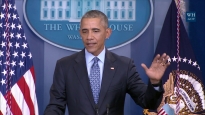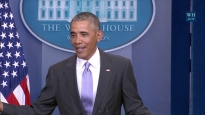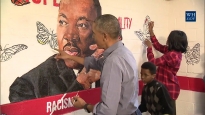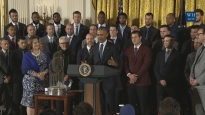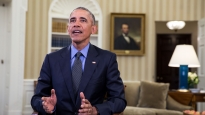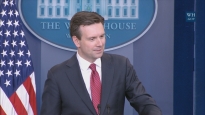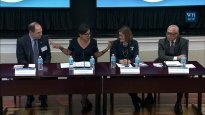The First Lady Announces the Mayors Challenge to End Veteran Homelessness
June 04, 2014 | 35:27 | Public Domain
First Lady Michelle Obama announces a new program that aims to end veteran homelessness in the U.S. by 2015.
Remarks by the First Lady Announcing Mayors Challenge to End Veterans Homelessness
East Room 1:49 P.M. EDT MRS. OBAMA: Thank you. (Applause.) Thank you so much, everyone. Thank you all. Well, welcome. Rest yourselves. Thank you so much. This is a good-news day, and I am honored to welcome everyone here to the White House. I want to start by thanking Chris. Let’s give Chris a round of applause for her courage. (Applause.) I look at Chris and I go she’s a baby. I mean, she served our country and she’s a baby. And Chris is also the face of veterans and the face of homelessness, which is why today is so important. And we are grateful that she could be here to share her story. We are proud of you, Chris, and proud of everything you’re going to do because we know you’re going to keep contributing. I also want to thank Secretary Donovan for his tremendous leadership at HUD, as well as Mayor Julian Castro, who we are confident will continue to build on the progress that we’ve been making. I also want to thank acting Secretary Sloan Gibson. Sloan and I have done some really good work together, and I am so happy he’s joining us and is going to keep doing great work. And we’re just grateful for his distinguished service to our country for so many years -- as well as Mayor Becker for doing such phenomenal work in Salt Lake City. I also want to recognize someone who doesn’t get a lot of attention, and that is Laura Zeilinger, who -- yes. (Applause.) Laura. Today is the first day I got to meet Laura, but her reputation precedes her. She is the Executive Director of the Interagency Council on Homelessness. So for many of the advancements we’ve made have, it’s been because of the Council’s work to streamline and coordinate our efforts across agencies. So I want to thank Laura and everyone from the Council for their outstanding leadership and service. And most of all, I want to thank all of you here today -– our guests, our mayors, our community leaders; the county and city, federal employees who work day in and day out to repay our debt to our veterans. Now, unfortunately, homelessness among our veterans is an issue that we’re all too familiar with. Sometimes we see these folks on our way to work or when we’re walking our kids home from school. We might pass them -- someone as we’re strolling through the park sitting on a bench and not even realize that he or she is a veteran. Maybe we say hello, offer to buy a sandwich, but often we just keep on going, rushing off to the next meeting, burying our heads into our smart phones. It’s not that we don’t care, it’s just that we think, well, there’s no way we’ll ever solve this problem, that’s just the way things go. But that kind of thinking starts to melt away when we better understand the stories of these veterans. The man who lost his arm in Vietnam, and when he and his wife’s medical bills kept piling up they lost their home. The Gulf War vet who injured her back and lost her job, and then her house, and spent months on the streets. The Army veteran from the Iraq War who survived cancer, but when she and her two kids were evicted from their home they had nowhere to go. These are just three stories. Altogether, roughly 58,000 veterans are experiencing homelessness in America today -– a number that, fortunately, has fallen sharply in the past few years. But whatever the number, these brave men and women have served this country with courage and grace. Some volunteered to serve; many others were drafted. They went off to faraway jungles and deserts and mountain regions; they saw their best friends fall in ambush, or because of a suicide bomb. Some of them were left wondering why they were the ones who survived. And after all that, too many of them have come home only to fight a new battle -– a battle to keep a roof over their head, a battle just to have somewhere to go when it rains. Now, I want to be very clear: The vast majority of our veterans return home in good health and good spirits. They go on to build good families, find good jobs. They keep serving this nation in their communities through their congregations and schools and neighborhoods. In fact, the percentage of veterans who are homeless today is actually just 0.3 percent of the total veteran population. But even one homeless veteran is a shame. (Applause.) And the fact that we have 58,000 is a moral outrage. We should all be horrified. (Applause.) Tens of thousands of veterans who risked their lives for our country are sleeping in their cars, or in a shelter, or next to a subway vent. We should be horrified because that’s not who we are as Americans. And so we can’t just throw up our hands and say that this problem is too big for us. Because the truth is, it’s not. When you break down the numbers, you see that those 58,000 homeless veterans are spread out across all of our cities and states. So even in some of our largest metropolitan areas, we’re often only talking about a few hundred people. For example, as of a year and a half ago, New Orleans had a total of 211 homeless veterans, and they’ve been driving that number down ever since. In Indianapolis, the most recent count of vets still out on the streets was 11. These numbers are still too high, because any number above zero is too much. And that’s why as President, my husband vowed to end this problem once and for all, and he’s -- absolutely. (Applause.) And he has directed record levels of funding toward helping homeless veterans, achieving historic success in getting our men and women in uniform into housing. Almost 90 percent of today’s homeless veterans served before 9/11, but this is the first time anyone has made this a government-wide priority. We’ve got HUD and the VA and the Interagency Council leading the way, and we’re also working with the Department of Health and Human Services, the Department of Labor and nonprofits and community leaders on the ground. We’ve cut through red tape and streamlined efforts across agencies, and together, we have made some extraordinary progress. For instance, Chris told you about those housing vouchers from HUD and the VA that helped her find a home. That program has existed since the early ‘90s, and up until 2008 it had housed a total of about 1,800 veterans. But this administration strengthened it to historic levels, and since 2008 the program has brought more than 73,000 veterans out of homelessness. (Applause.) And I’m not mathematician, but somebody did the numbers for me. (Laughter.) That means that in the last few years, more than 40 times as many veterans have been helped than during most of the program’s entire history. And the other program Chris mentioned, the Supportive Services for Veterans Families, the SSVF, is a new program started by this administration three years ago to prevent low-income veteran families from falling into homelessness. And last year alone, it served more than 60,000 veterans and their family members, and next year, we expect that number to grow to over 100,000. Yes. (Applause.) And as we all know, these programs are making a significant difference. Even during difficult economic times, veteran homelessness in America has dropped by 24 percent in just three years. So we’re beginning to make some real important progress on this issue. But we know that we are nowhere near finished. As I said before, any number above zero is way too high, and we still have tens of thousands of vets without a home. So we can’t rest, not even for a moment. And that’s why I am so thrilled and everyone in this building is so happy to announce a new effort called the Mayors Challenge to End Veteran Homelessness. We have got 77 mayors, four governors, four county officials on board already. These leaders -- yes, yes. (Applause.) These leaders are best equipped to tackle this challenge because they know their communities inside and out, and they’re in touch with service providers who know these veterans by name. So they aren’t just going to address veteran homelessness in their cities and states, they’re going to end it –- and they’re going to do it by the end of 2015. That is an audacious goal. (Applause.) It is an audacious goal, but it is achievable. It is absolutely achievable. We have seen incredible success at the local level already. As you heard, Mayor Becker, as well as his counterpart in Phoenix, Mayor Greg Stanton, they’ve already effectively ended chronic homelessness among veterans in their states. In New York, they’ve housed more than 2,000 veterans in the last year alone. Governor John Hickenlooper in Colorado has been making some incredible progress on this issue for almost a decade. And Governors Mark Dayton and Dan Malloy in Minnesota and Connecticut are also on board, as well. And we’ve got mayors like Chris Coleman from St. Paul, Minnesota, Mitch Landrieu from New Orleans, and Annise Parker from Houston. And all of these leaders are involved because this isn’t just the right thing to do for our veterans, it’s also the right thing to do for their budgets. Recent studies have shown that just one chronically homeless person can cost communities between $30,000 to $50,000 per year in emergency room visits, medical bills, and law enforcement. For some individuals, it can be even higher. But the cost to give someone a home of their own is only about $20,000. So this makes sense on so many different levels. And that’s why I want to applaud everyone who is already leading the way in this effort. And I also want to urge more leaders across the country to get involved, as well. We’ve got to get more people. I know how competitive our mayors can be. (Laughter.) I’ve seen it. That’s why I’m very excited, because you all -- guys like to beat each other and challenge each other. We saw it in Phoenix and Salt Lake City. So I want to know if more mayors can challenge each other on this issue. Can you challenge a neighboring mayor or governor to see who can get all their vets into housing first? That’s the kind of challenge -- can you challenge yourself to be the first to end veterans homelessness in the Midwest or in the South? Take a region, get it done. Can each of you get just one more mayor or one more governor to sign up? And this challenge isn’t just for mayors, governors, and county officials, but it’s for all of us –- for businesses and congregations and community organizations. And that’s where we hope Joining Forces can help. When Jill Biden and I started Joining Forces three years ago, one of the groups we were most concerned about was our homeless vets. But the truth is, we didn’t really know how to get started. But over the past few years, as we’ve seen federal and local efforts succeed, we’ve realized that this problem isn’t too big for us to tackle. So today, in addition to announcing this wonderful new effort, we are issuing a call to action to Americans all across the country to do their part to take this issue on. We’re asking all of you out there to volunteer your time to help these veterans navigate the system to find the resources they’ve earned. Maybe you can donate money from your business to pay a veteran’s security deposit. Maybe you can start a donation drive in your community to support efforts to get vets into housing. And if your mayor isn’t on board yet, light up their phone lines -- (laughter) -- write in to the newspaper. We all have power to make a real difference on this issue. We have the power to change lives here. You heard that from Chris. But we have another example. We have a wonderful man named Doran Hocker, who’s here with us today. Doran served in the Air Force for three years, including a deployment to Korea during the Vietnam War. Now, he never saw combat, but he saw more death and devastation than most of us ever will. So when he got back to the States, Doran says the first thing he did was kneel down on a patch of grass and kiss the ground. But in the months and years that followed, Doran just couldn’t shake the things he’d experienced. He started drinking more and isolated himself from his wife and his baby daughter. He ended up getting a divorce and falling in with the wrong people. And for almost three decades, Doran was homeless. As he says now, he says, “I tried to kill myself for 30 years, slowly.” He said, “It got so bad that people were throwing change at my feet in the streets.” And finally, Doran decided to turn his life around. He wrote down a list of 21 things he wanted to accomplish -– things like opening a bank account, cooking in his own kitchen. He moved from Detroit to St. Paul, Minnesota, and once he got there he walked across town to a local nonprofit that he knew could help him. With their help and the help of the Minnesota Assistance Council for Veterans, he got into housing and a substance abuse treatment program. And today, Doran has checked off all 21 items on that list. He’s cooking in his own kitchen -- Doran, please stand. (Applause.) A little cooking in the kitchen. (Laughter.) Paying his own rent. He even hugged his daughter who he’d been separated with for almost 25 years. And like so many of our veterans, Doran continues to give back. He is working full time as a caseworker to help other veterans find and sustain housing of their own. He’s dedicating his life to making sure that every veteran who comes home will never have to go through what he did. And here’s the thing -- that’s especially important now, because with our war in Iraq over and our war in Afghanistan drawing to a close, thousands of men and women who risked their lives for this country are transitioning back home. And we cannot make the same mistakes for this generation that we have had for the past generation. So that means we’ve got to move quickly. We’ve got to share best practices between cities. We’ve got to find every veteran like Chris and make sure that she doesn’t fall into homelessness in the first place. And we’ve got to reach out to every veteran from Doran’s generation and get them under a roof right this minute. We have made great progress over the past few years because of leaders like all of you who refuse to accept veteran homelessness as a fact of life. And now we have to finish the job once and for all, because when a veteran comes home kissing the ground, it is unacceptable that he should ever have to sleep on it. (Applause.) So just like it’s our country’s duty to bring back all of our men and women from the battlefield, we’ve also got a duty to make sure that every single veteran has a place to call home when they get here –- and for the rest of their lives. So thank you all. Thank you for this effort. Thank you for your courage. Thank you for all the work that so many of you have been doing on the ground long before we ever showed up. This means so much to these men and women and their families. It is truly a sign that they are coming home to a grateful nation, and I am proud to be a part of this effort. So let’s get to work. Thank you all. God bless. (Applause.) END 2:10 P.M. EDT|
January 18, 2017
|
January 17, 2017
|
January 16, 2017
|
January 16, 2017
|
|
January 14, 2017
|
January 13, 2017
|
January 13, 2017
|
January 12, 2017
|
